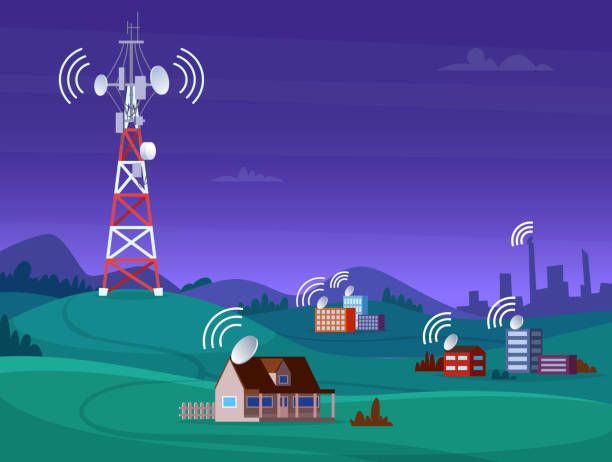If you live in a remote area or a location with limited access to traditional broadband services, satellite internet can be a lifesaver. However, like any internet connection, satellite internet comes with its own set of challenges. From bandwidth limitations to latency issues, there are several factors that can impact your satellite internet experience. In this article, we’ll explore some effective strategies to improve your Satellite internet connection and enhance your online experience.
What is Satellite Internet?
Satellite internet is a type of internet connection that utilizes satellites orbiting the Earth to provide coverage to areas where traditional broadband services are unavailable or impractical. Instead of relying on cables or phone lines, satellite internet users connect to the internet via a satellite dish installed on their property.
Why is Satellite Internet important?
Satellite internet plays a crucial role in bridging the digital divide by providing internet access to rural and remote areas where traditional infrastructure is lacking. It enables residents, businesses, and organizations in these areas to stay connected, access online resources, and participate in the digital economy.
What Makes it Different?
Satellite internet is different from other types of internet connections due to its unique method of delivery and coverage. Here are some key factors that make satellite internet different from others. Keep reading for a better understanding.
Delivery via Satellite:
Unlike traditional broadband services that rely on cables, DSL, or fiber-optic lines, satellite internet delivers internet connectivity via satellites orbiting the Earth. This means that users connect to the internet through a satellite dish installed at their location, which communicates with satellites in space.
Coverage:
One of the most significant advantages of satellite internet is its extensive coverage. It can reach remote and rural areas where laying down traditional infrastructure like cables or DSL lines is not feasible or cost-effective. This makes satellite internet a crucial tool in bridging the digital divide, providing internet access to underserved communities around the world.
Independence from Ground Infrastructure:
It is not dependent on ground-based infrastructure, making it resilient to natural disasters, infrastructure damage, or geographical limitations. This independence allows users in remote locations to access the internet reliably, even in challenging environments.
Higher Latency:
Other than that, one notable difference with satellite internet is its higher latency compared to other types of connections. Because data signals must travel to and from satellites in space, there is a delay in the transmission of data. This can result in slower response times, which may impact activities like online gaming or video conferencing.
Data Caps and Fair Access Policies:
Many internet providers impose data caps and Fair Access Policies (FAPs) to manage network traffic and ensure fair usage among subscribers. Users who exceed their data caps may experience reduced speeds or temporary restrictions on their internet access until the next billing cycle.
Weather Interference:
Satellite internet signals can be susceptible to interference from inclement weather conditions such as heavy rain, snow, or storms. This can cause temporary disruptions or slowdowns in internet connectivity, particularly in regions prone to severe weather.

Common Issues
Despite its benefits, satellite internet is not without its challenges. Some of the most common issues faced by satellite internet users include:
Bandwidth limitations:
Satellite internet providers often impose data caps and Fair Access Policies (FAPs) that limit the amount of data you can use each month. Exceeding these limits can result in reduced speeds or additional charges.
Latency issues:
Satellite internet connections are inherently slower than other types of internet connections due to the distance that signals must travel between the user’s satellite dish, the satellite in orbit, and the ground station. This can result in higher latency, which can be particularly noticeable in activities such as online gaming or video conferencing.
Weather interference:
Satellite internet signals can be affected by inclement weather conditions such as heavy rain, snow, or storms. This can cause temporary disruptions or slowdowns in your internet connection.
Tips for Improving Satellite Internet
Positioning your satellite dish correctly: Make sure that your satellite dish is properly aligned and free from obstructions such as trees, buildings, or other objects that could interfere with the signal. A clear line of sight to the satellite is essential for optimal performance.
Upgrading your equipment: Invest in high-quality satellite internet equipment, including a modern satellite dish, modem, and router. Newer equipment tends to be more efficient and reliable, leading to better overall performance and faster speeds.
Optimizing your internet usage: Monitor your internet usage and avoid bandwidth-heavy activities, such as streaming high-definition video or downloading large files, during peak hours when network congestion is more likely. Schedule these activities for off-peak times to maximize available bandwidth.
Using web acceleration techniques: Explore options for web acceleration technologies such as content delivery networks (CDNs) or caching proxies. These technologies can help reduce latency and improve page load times by caching frequently accessed content closer to the user.
Choosing the right satellite internet provider: Research the available satellite internet providers in your area and compare plans, pricing, and customer reviews. Look for providers that offer reliable service, fast speeds, and competitive pricing to ensure a positive internet experience.
Implementing these tips can help you optimize your satellite internet connection and enhance your online experience, whether you’re browsing the web, streaming content, or working remotely.
| Call 866-861-4084 for Internet Deals |
Get the Best Satellite Internet
If you’re looking for the best satellite internet service, there are several factors to consider to ensure you get the most suitable option for your needs. Here are some tips to help you find the best satellite internet provider:
Coverage:
Start by checking the coverage maps provided by different satellite internet providers. Look for providers that offer coverage in your area, especially if you live in a rural or remote location where traditional broadband services may not be available.
Speed:
Consider your internet usage habits and the speed requirements of your household or business. Look for satellite internet plans that offer sufficient download and upload speeds to support activities such as streaming, gaming, video conferencing, and browsing without experiencing slowdowns or buffering.
Data Allowance:
Check the data allowances and Fair Access Policies (FAPs) of different satellite internet plans. Some providers impose data caps or throttle speeds for users who exceed their monthly data allowance, which can affect your internet experience. Choose a plan with generous data allowances or unlimited data options if you have high data usage requirements.
Equipment Quality:
Evaluate the quality of the internet equipment provided by each provider. Look for providers that offer modern and reliable satellite dishes, modems, and routers that are capable of delivering stable and fast internet connections.
Pricing and Contracts:
Compare the pricing and contract terms of different satellite internet plans. Look for providers that offer competitive pricing with transparent billing practices and flexible contract options, such as month-to-month plans or no-contract options, to avoid long-term commitments or early termination fees.
Additional Features:
Consider any additional features or perks offered by satellite internet providers, such as free installation, bundled services, Wi-Fi hotspot access, or promotional deals. These extras can add value to your internet service and enhance your overall experience.
Customer Support:
Research the customer support reputation of each satellite internet provider. Read reviews and testimonials from current and former customers to gauge the quality of customer service, technical support, and responsiveness to issues or inquiries.

Best Satellite Internet Provider
Finding the best satellite internet provider depends on various factors such as coverage, speed, data allowances, customer support, and pricing. While there isn’t a one-size-fits-all answer, some providers consistently rank highly based on customer satisfaction, network performance, and value for money. Here are a few top internet providers worth considering:
HughesNet:
HughesNet is one of the largest satellite internet providers in the United States, offering nationwide coverage with multiple plans tailored to different usage needs. They provide reliable service with speeds up to 25 Mbps, along with bonus data during off-peak hours. HughesNet also offers professional installation and 24/7 customer support.
To know more about HughesNet, check out our guide on HughesNet Review.
Viasat (formerly Exede):
Viasat is another leading satellite internet provider known for its high-speed plans and wide coverage area. With speeds reaching up to 100 Mbps in select areas, Viasat offers competitive performance for streaming, gaming, and other online activities. They offer a range of data plans with varying speeds and data allowances, along with free standard installation and a two-year price lock guarantee.
Starlink:
Starlink, a satellite internet service provided by SpaceX, is rapidly expanding its coverage and garnering attention for its cutting-edge technology and ambitious plans. It aims to deliver high-speed internet access to underserved rural areas using a constellation of low Earth orbit (LEO) satellites. While still in its early stages, Starlink has shown promising results with speeds exceeding 100 Mbps and low latency.
Dish Network:
Dish Network offers satellite internet service through partnerships with multiple providers, including HughesNet and Viasat. They provide flexible plans with varying speeds and data allowances, along with bundle options for TV and internet services. Dish Network also offers professional installation and 24/7 customer support.
Rural WiFi:
Rural WiFi specializes in providing satellite internet solutions for rural and remote areas in the United Kingdom and Ireland. They offer a range of internet packages with speeds up to 50 Mbps and unlimited data options. Rural WiFi prioritizes customer satisfaction and provides personalized support to ensure reliable connectivity for their users.
However, when choosing the best satellite internet provider for your needs, it’s essential to consider factors such as availability in your area, desired speeds, data requirements, and budget. Researching customer reviews, comparing pricing, and reaching out to providers for more information can help you make an informed decision.
Conclusion
While satellite internet has its challenges, there are plenty of ways to improve your connection and make the most of this valuable resource. By following the tips outlined in this article and staying informed about advancements in satellite technology, you can enjoy a faster, more reliable internet experience no matter where you are.
FAQs (Frequently Asked Questions)
Can I stream video content with satellite internet?
Yes, you can stream video content with satellite internet, but you may experience buffering or reduced video quality during periods of high network congestion or inclement weather.
Is satellite internet suitable for online gaming?
Satellite internet can be used for online gaming, but the higher latency may result in lag and slower response times compared to other types of internet connections.
How do I know if satellite internet is available in my area?
You can check the coverage maps provided by internet providers or use online tools to determine if satellite internet service is available at your location.
Can I use satellite internet on the go?
While satellite internet is primarily designed for fixed locations, there are portable satellite internet solutions available for travelers and outdoor enthusiasts.
What should I do if I experience frequent outages or disruptions with my satellite internet?
If you’re experiencing frequent outages or disruptions with your internet connection, contact your service provider for assistance troubleshooting the issue.

Meet Jennifer Harper, a wordsmith extraordinaire who has been shaping the digital landscape with her creative prowess for the past two years. Not just a content writer; she is a storyteller who brings the content to life. Her passion for internet trends, memes, and the ever-evolving world of entertainment is evident in every piece she creates. Jennifer doesn’t just follow trends; she sets them.